Kamala Harris’ tip policy wasn’t a Trump ripoff. It prevents billionaires from screwing us again.
While Trump accuses Kamala Harris of stealing his idea of not taxes on tips, the truth is much more profound. Harris protects America from the wealthy getting yet another tax break.
YOUR SUPPORT IS CRITICAL FOR US TO KEEP THE PACE NECESSARY TO WIN!
We are grateful for our Paid Subscribers and Free Subscribers. In this political climate, we need several hundred more Paid Subscribers. Misinformation funded by the deep pockets of our Oligarchy floods the internet. We are using all our platforms on-air, online, and in publications to counter that. We ask that you invest the equivalent of less than a coffee to ensure we can keep doing this effectively. Please invest in a Democracy that serves all of us by becoming a paid subscriber. It comes with many benefits.
Kamala Harris’ Opportunity Economy
Lines between genuine policy and rhetorical grandstanding are often blurred. It’s crucial to dissect the true intentions behind our leaders’ policies. Recently, Donald Trump accused Kamala Harris of “stealing” his idea regarding taxing tips for service workers. However, this claim is misleading and obscures the broader issue of who truly benefits from such policies. To understand the significance of Harris’ proposal, one must look beyond the surface and recognize the distinct differences between her approach and Trump’s and how it aims to protect ordinary workers from being exploited by the wealthy elite.
Trump’s proposal regarding the non-taxation of tips was presented as a populist measure to benefit everyday service workers. He framed it as a way to relieve financial pressure on tip-earning employees by ensuring their hard-earned tips would not be subject to taxation. On the surface, this sounds like a noble cause that aligns with working-class Americans’ interests. However, a closer examination reveals that this policy had little to do with genuinely helping tip workers and everything to do with creating a loophole that the wealthiest individuals could exploit.
The reality is that many tip workers, particularly those in low-wage positions such as restaurant servers and hotel staff, often do not earn enough to reach the income threshold where they would be required to pay taxes on their tips. This means that most of these workers already do not pay taxes on their tips because their overall income is too low. So, when Trump proposed that tips should not be taxed, he offered a solution to a problem that did not exist for most tip workers.
The likely beneficiaries of Trump’s policy would have been high-income individuals who could reclassify some of their earnings as “tips” to avoid paying taxes. Hedge fund managers, stock brokers, and other wealthy professionals could exploit this loophole to shield a significant portion of their income from taxation. In essence, Trump’s proposal would have allowed the rich to prosper even more under the guise of helping the working class—a classic example of trickle-down economics disguised as populism.
Kamala Harris’ policy, on the other hand, takes a fundamentally different approach. While she also proposes that tips should not be taxed for certain workers, her policy is explicitly targeted at low-wage earners in the service industry. Harris recognizes that exempting tips from taxation is insufficient to address these workers’ systemic issues. Her plan includes a commitment to raising the minimum wage to a living wage, ensuring that all workers, including those who rely on tips, earn enough to support themselves and their families without relying on their employers’ whims or customers’ generosity.
Harris’ proposal is designed to close the loopholes that Trump’s policy would have created, ensuring that the benefits of tax relief are directed where they are needed most—towards low-income workers rather than wealthy individuals who can manipulate the system to their advantage. This is a crucial distinction that highlights the difference between a policy that is genuinely aimed at helping working-class Americans and one that is designed to provide additional benefits to the wealthy under the guise of populism.
Moreover, Harris’ policy goes beyond just the issue of taxation. She acknowledges the broader context of workers’ rights and the need for comprehensive labor reform. For instance, she has spoken out against the Trump-era policy that allowed employers to claim ownership of tips collected by workers through credit card transactions. This policy effectively legalized wage theft, enabling employers to withhold tips from workers or use them for purposes other than compensating the employees who earned them. Harris’s commitment to reversing such policies indicates her broader focus on protecting workers’ rights and ensuring they are fairly compensated for their labor.
In contrast to Trump’s hollow populism, Harris’ approach is rooted in a genuine concern for the welfare of working-class Americans. She understands that real economic justice requires more than just symbolic gestures—it requires targeted policies that address the root causes of inequality and provide meaningful support to those who need it most.
The narrative that Kamala Harris “stole” Trump’s idea on tips is not only false but there are substantive differences between their approaches. While Trump’s proposal would have created a tax loophole that benefited the wealthy at the expense of ordinary workers, Harris’ policy is designed to protect low-wage earners and ensure that they receive fair compensation for their labor. By focusing on raising the minimum wage and closing loopholes, Harris is working to build an economy that works for everyone—not just the rich. This is the kind of leadership that America needs, and it is a stark contrast to the self-serving policies of the past.
Viewers are encouraged to subscribe and join the conversation for more insightful commentary and to support progressive messages. Together, we can populate the internet with progressive messages that represent the true aspirations of most Americans.
Can we count on your help to reach our goal of 100 new paid subscriptions by the end of the month?
The other side has big donors and everyday citizens who invest heavily in platforms that lie and misinform. All we have is you. So, please invest in our media outlet by clicking the subscribe button below to become a paid subscriber. You won’t miss that coffee, but it will make a difference in our politics as we spread the truth about our policies and progressive politics. All paid subscribers get to read my five books on this platform and all subsequent books I write. They will also be privy to subsequent incentives.

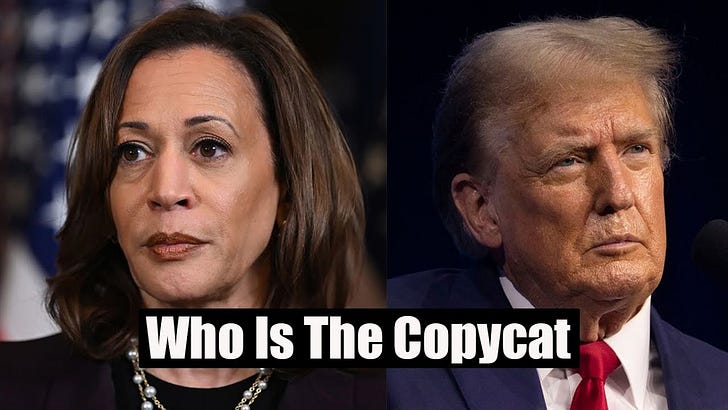



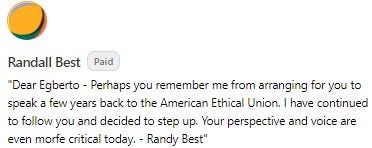
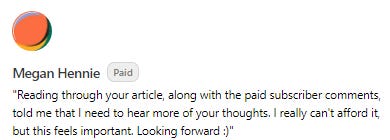
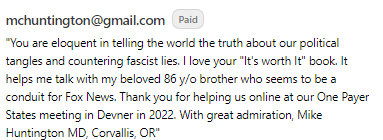
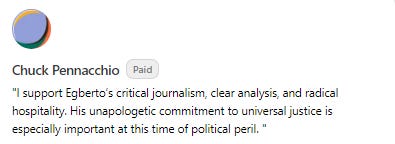
"Opportunity Economy"? Harris had a wide-open opportunity in 2021 to boost the minimum wage. With eyes wide open, she blew it -- displaying a lack of courage and vision and, one might add, insufficient integrity. She and she alone stood in the way. Tens of millions of hourly workers have suffered from Harris' failure ever since. https://www.levernews.com/harris-has-to-decide-senate-decorum-or-working-class-policy
Egberto, until I read today's post I had no idea there was any difference between Harris and Trump on taxing tip income. Like most folks, I thought it was just a cheesy Harris copycat gimmick. Many pundits said as much, so they didn't understand the truth either -- although this is what they do for a living. Thanks very much for setting the record straight!
I'm a longtime writer and strategist in B2B marcom (to civilians, that's business-to-business marketing communications). From this standpoint, IMO the real issue is not the policy difference, but the total failure of the Democratic Party and the Harris campaign to spotlight the difference! Remember the classic 1967 film, Cool Hand Luke? "What we've got here, is a failure to communicate."
With huge money pumped into this presidential campaign, you'd think the Dems and Harris team would invest in such communication. Looks like they're just too freakin' stupid to hire you and me for this vital mission! It's a major loss to the nation as well as to your income and mine! :-)